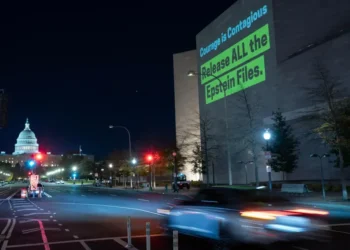California Revokes Thousands of Immigrant Commercial Licenses After Federal Audit Findings
California authorities have announced plans to revoke 17,000 commercial driver’s licenses issued to immigrants after determining that the documents carried expiration dates extending beyond the drivers’ legally authorized stays in the United States. The decision follows an internal review launched after concerns raised by the U.S. Department of Transportation, setting off renewed tensions between state officials and the Trump administration over licensing rules for noncitizen workers.
State officials said the revocations are required under California law, which mandates that commercial driver’s licenses must expire no later than the end of the holder’s documented legal status. The move affects workers across logistics, agriculture, shipping, and transportation—sectors where immigrants make up a significant share of the labor force.
The issue gained national attention earlier this year after several fatal crashes involving drivers without permanent legal status sparked wider debate about federal and state compliance with immigration and safety regulations.
Federal Audit Sparks Licensing Review
Transportation Secretary Sean Duffy sharply criticized California’s decision, calling it confirmation that the state “acted improperly” despite earlier defending its licensing procedures. Duffy said the review began only after federal officials questioned whether the state had accurately matched license expiration dates with immigration records.
“After weeks of claiming they did nothing wrong, Gavin Newsom and California have been caught red-handed,” Duffy said, arguing that the revocations demonstrate that state agencies issued commercial trucking licenses in violation of federal standards. He added that the Transportation Department would continue demanding “proof that every illegal immigrant has been removed from behind the wheel of semitrucks and school buses.”
California denies the allegation of wrongdoing, saying the affected drivers all held valid federal work authorizations at the time of issuance. Officials said the discrepancy stems from how federal immigration status updates were reported to the state’s Department of Motor Vehicles.
State Pushes Back Against Federal Claims
Gov. Gavin Newsom’s office initially declined to elaborate on the precise legal basis for the revocations. Later, his administration clarified that the licenses exceeded the end-dates of temporary work authorization records, violating a California statute requiring license validity to match federal immigration status timelines.
Brandon Richards, a spokesperson for Newsom, criticized Duffy’s statements, describing them as politically motivated and factually incorrect.
Richards said the state followed issuance guidance it previously received from the U.S. Department of Homeland Security regarding noncitizen commercial licensing. California argues that any inconsistencies resulted from federal updating delays rather than state-level mismanagement.
Deadly Crashes Renew Safety Scrutiny
The policy debate intensified following high-profile accidents involving commercial drivers without legal authorization to remain in the country.
In August, a tractor-trailer driver who lacked U.S. authorization made an illegal U-turn in Florida, causing a collision that killed three people. Fatal crashes in Texas, Alabama, and California involving drivers in similar circumstances also heightened concerns over safety, verification, and state compliance with federal requirements.
These incidents have been cited by federal officials as justification for a stricter approach toward licensing noncitizen drivers, particularly those operating heavy commercial vehicles.
Federal Restrictions Tighten Eligibility Rules
Earlier this year, Duffy imposed new nationwide limits on which immigrants may obtain commercial driver’s licenses. Under the revised policy, only three visa categories—H-2A, H-2B, and E-2—are eligible. These visas are primarily granted to temporary agricultural laborers, seasonal nonagricultural workers, and foreign investors, respectively.
The rules require states to verify applicant immigration status through a federal database, and licenses may remain valid for no more than one year or until the visa expires, whichever comes first.
The Transportation Department says roughly 200,000 noncitizens currently hold commercial licenses nationwide, but fewer than 10,000 would qualify under the new system. The changes are not retroactive, meaning existing drivers will retain their licenses until renewal unless separate state actions—like California’s revocations—intervene.
Funding Penalties and Compliance Pressure
Federal officials have tied the licensing controversy to broader compliance issues. Duffy previously revoked $40 million in federal transportation funding after concluding that California failed to enforce English-language proficiency requirements for commercial drivers. He has also threatened to withhold an additional $160 million if the state does not fully invalidate licenses found to be out of compliance and address other audit findings.
California says it is revoking the licenses as part of an effort to comply with state law and respond to audit concerns, despite disagreement over the federal interpretation of those findings. Drivers affected by the action have been notified that their licenses will expire in 60 days.
Duffy said federal investigators found that roughly a quarter of the 145 California licenses sampled in a September review should not have been issued. In several cases, licenses remained valid years after a driver’s temporary work permit had expired.
Ongoing Debate Over State and Federal Standards
California insists that its licensing practices were consistent with federal guidance in place at the time the 17,000 licenses were issued. The state argues that it is now correcting administrative inconsistencies identified in the audit, not validating the federal government’s broader criticisms.
The dispute highlights a long-running tension between state autonomy and federal oversight in immigration-related licensing and workforce regulation. With commercial trucking facing persistent labor shortages, the revocations may also have economic implications for freight and supply chain operations across the region.
For now, California says it will continue reviewing its licensing processes while engaging federal officials on how to align state requirements with evolving national policies.
This article was rewritten by JournosNews.com based on verified reporting from trusted sources. The content has been independently reviewed, fact-checked, and edited for accuracy, neutrality, tone, and global readability in accordance with Google News and AdSense standards.
All opinions, quotes, or statements from contributors, experts, or sourced organizations do not necessarily reflect the views of JournosNews.com. JournosNews.com maintains full editorial independence from any external funders, sponsors, or organizations.
Stay informed with JournosNews.com — your trusted source for verified global reporting and in-depth analysis. Follow us on Google News, BlueSky, and X for real-time updates.














